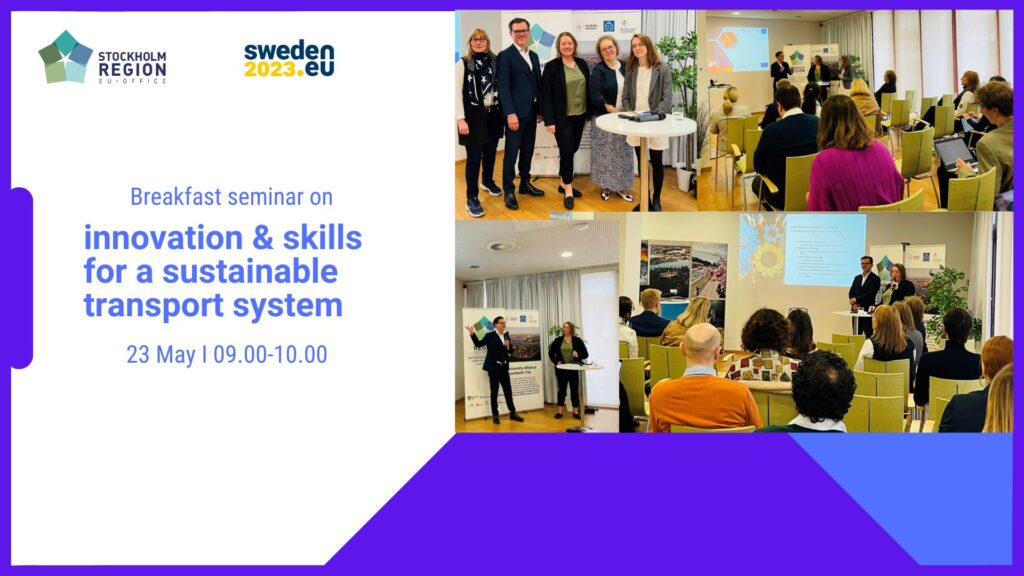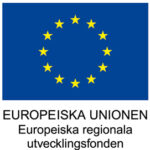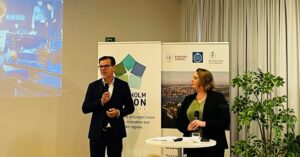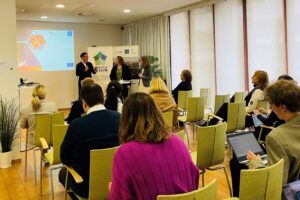
On 23 May, Stockholm Region EU Office in collaboration with Fordonsdalen (“vehicle valley”) organised a breakfast seminar on innovation and skills for a sustainable transport system from a regional perspective, connecting both to the overall goal of making the European transport system greener and more digital as well as the European Year of Skills. The breakfast seminar is the third seminar that we organise during the spring in connection to the Swedish presidency in the Council of the European Union.
About Fordonsdalen
Fordonsdalen is a project run by Region Stockholm and KTH Royal Institute of Technology that is co-financed by the European Regional Development Fund and Region Stockholm’s Project Fund for sustainable regional development. Other partners include Kista Science City, Södertälje Science Park, other regions in East Central Sweden, and several large companies. The goal of the project is to strengthen the competitiveness of the regional automotive industry and to transition into a sustainable transport system. Fordonsdalen has several different projects to support small and medium-sized enterprises (SMEs) in the automotive industry, to increase research and innovation capacity in the region, as well as to develop test and demonstration arenas, reskilling platforms, and deepening interregional collaborations.

![]()
The seminar
The guest speakers Ms Astrid Johansson, Project Coordinator, Region Stockholm and Mr Magnus Burman, Project Lead, KTH Royal Institute of Technology underlined that collaboration is key to transforming the transport system, between the municipalities, the regions, the companies, and academia. Similar challenges are faced by all these actors related to the transport system, and it is important that technology and policy go hand in hand.
 Ms Johansson stressed that the automotive sector is a key industry for Sweden since it is the single largest export for the country. Sweden aims to become one of the world’s first fossil-free welfare states. To manage this, change is needed in the transport sector and in the automotive industry. The region of Stockholm plays a central role in this since a third of all employees in the automotive sector in Sweden are based in Region Stockholm and the adjacent regions. Looking ahead, there will be a strong focus on the green and digital transformation, for instance on autonomous driving and circular production.
Ms Johansson stressed that the automotive sector is a key industry for Sweden since it is the single largest export for the country. Sweden aims to become one of the world’s first fossil-free welfare states. To manage this, change is needed in the transport sector and in the automotive industry. The region of Stockholm plays a central role in this since a third of all employees in the automotive sector in Sweden are based in Region Stockholm and the adjacent regions. Looking ahead, there will be a strong focus on the green and digital transformation, for instance on autonomous driving and circular production.
Mr Burman also pointed out that reaching out to and working with SMEs is a central part of the project, as well as finding ways to overcome the challenge that many of them lack the time and often have to prioritise short-term goals over the more long-term green and digital transition.
Mr Burman stressed that according to a study by Handels consulting 76% of companies in the automotive component industry believe there is a lack of personnel with the right competence and that more than half of the companies believe they will require more staff in the future. To address this challenge, Fordonsdalen includes a project called Fordonsdalen React that focuses on reskilling and upskilling. It is led by Region Stockholm and is partly financed by Region Stockholm’s Project Fund for sustainable and regional development and partly by the European Regional Development Fund. Through an online education platform, short courses are offered on different topics such as cybersecurity and circular economy to increase the competence at the company so that their sustainability work can be developed and accelerated.
 The project Fordonsdalen React is inspired by an experiment done by KTH Royal Institute of Technology called the Software Development Academy. The academy aimed to reskill newcomers who has an academic background by offering training in digital skills in just 15 weeks, as well as job matchmaking. The results show cost effectiveness, and that a high percentage of participants got a job within IT in six months.
The project Fordonsdalen React is inspired by an experiment done by KTH Royal Institute of Technology called the Software Development Academy. The academy aimed to reskill newcomers who has an academic background by offering training in digital skills in just 15 weeks, as well as job matchmaking. The results show cost effectiveness, and that a high percentage of participants got a job within IT in six months.
Please find the full presentation here.
Discussion
Reskilling and upskilling are clearly topics that is of concern across Europe, which was highlighted during the discussion with comments on the education system not being tailored to the needs of today’s labour market and that there is a large need for creative and innovative solutions to achieve the re- and upskilling needed. Certification of the education received is another side of the coin to ensure that a person who takes a course to re- or upskill can prove her or his newly acquired knowledge. Regarding Fordonsdalen React’s education platform, certification is an ongoing discussion but not the main objective since the focus is rather on reskilling and upskilling the current workforce of SMEs.
Other breakfast seminars
Breakfast seminar on Health Data – 7 Mars 2023
Breakfast seminar on Impact Investment – 25 April 2023
Read more
The European Year of Skills
/Rebecca Timm, Strategic Communicator and Mikael Eliasson, trainee at Stockholm Region EU Office